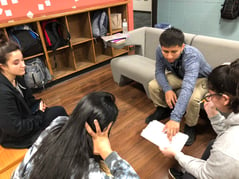The Benefits of Student Agency
Equipping Students With the Skills They Need for a Successful Future
Students yearn for learning experiences where their passions meet opportunities for action. They long for chances to take learning into their own hands, to let their own interests guide their instruction. They want to grow into successful, self-motivated adults — even though they may lack the vocabulary to express it.
It’s no surprise, then, that students gravitate toward experiential learning programs—like youth entrepreneurship programs—which, by their nature, promote student agency by encouraging them to investigate and pursue topics of interest.
As author John Spencer writes, “(E)ngaging environments often promote empowerment because they focus on student agency and ownership.”
Learning with a Purpose
 Our latest report, “Learning with a Purpose: Student Agency and the Joy of Teaching and Learning,” explores the pivotal role entrepreneurship education can play in purposeful learning and student agency. The report highlights ways these programs set students up for future success by equipping them with resilience, adaptability, and problem-solving skills.
Our latest report, “Learning with a Purpose: Student Agency and the Joy of Teaching and Learning,” explores the pivotal role entrepreneurship education can play in purposeful learning and student agency. The report highlights ways these programs set students up for future success by equipping them with resilience, adaptability, and problem-solving skills.
And, through the interviews with their teachers in the Uncharted Learning’s INCubatoredu program, the report shows the sheer joy pandemic-weary teachers experience when they see students flourish in these programs.
Educator Feedback
“You end up being a cheerleader for sure,” said Anthony Miller, an entrepreneurship teacher from Conant High School in Hoffman Estates, IL outside Chicago, Illinois. “There’s an intrinsic feeling you get as an educator when you see the kids go the extra mile—15, 16, and17-year-olds who were able to do this.”
Throughout the report, educators explain how students enrolled in programs that promote student agency—like entrepreneurship and experiential learning programs—were able to better navigate the uncertainty and ambiguity brought on by the pandemic since the curriculum prepares students to deal with rapid change and unexpected setbacks.
These teachers say that they know their students have developed agency when they stop asking for permission and take the initiative to do something themselves—because they know it’s the best thing for their INCubatoredu team.
Student-Driven Learning
“They feel in control. They feel like they have a purpose, like this is more than just turning in a worksheet,” said Valerie Cooper, who teaches entrepreneurship courses at Lewisville Independent School District in Lewisville, Texas. “Every day, there is accountability. My students become more comfortable with ambiguity. They get comfortable and start taking initiative.”
.jpg?width=5405&name=INCUBATOR.blog%20(2).jpg)
Most of all, the report emphasizes how agency is the key to students learning the skills they’ll need to reach their full potential: perseverance, critical thinking, and flexibility. While it may pull everyone—including educators and district leaders—out of their comfort zones, the opportunity to build student agency pays dividends in the long run.
According to Dr. Johnnie Thomas, superintendent of Rich Township High School District 227 outside Chicago and author of the report’s foreword, INCubatoredu is part of a district-wide plan for all students to set challenging goals for themselves, whether they are bound for higher education or the workforce.
“We expect our students to take responsibility for their own learning,” he writes. “Agency means discovering what motivates them, striving for continuous improvement and rebounding from their ‘failures.’ It’s not only the key to learning but the cornerstone of a successful life.”
Read more about the connection between purposeful learning, student agency, and something everyone can use a little more of this year: joy.
 This is a guest post by author Evo Popoff. Evo was named State Policy Maker of the Year by the State Education Technology Directors Association and ranks among the small handful of education policymakers who have worked as education entrepreneurs and executives in the private sector. Evo previously served as chief innovation and intervention officer and assistant commissioner for the New Jersey Department of Education.
This is a guest post by author Evo Popoff. Evo was named State Policy Maker of the Year by the State Education Technology Directors Association and ranks among the small handful of education policymakers who have worked as education entrepreneurs and executives in the private sector. Evo previously served as chief innovation and intervention officer and assistant commissioner for the New Jersey Department of Education.
